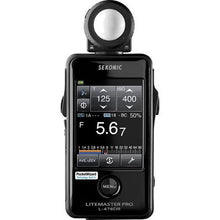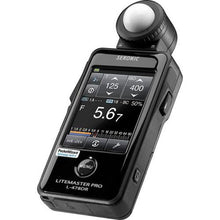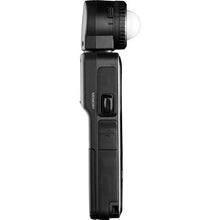Description
The Sekonic Litemaster Pro L-478DR Light Meter is an incident and flash meter featuring a color touch screen interface. The touch screen-based navigation lends itself to a highly intuitive and efficient workflow, allowing you to quickly modify exposure settings and navigate menus. This meter is also highly versatile and capable of measuring flash, incident and reflected light for still, HD video, or cine applications.
The L-478DR can be customized or adapted to your own specifications; depending on the metering modes you use most often, you can hide certain modes to create a more streamlined menu system. Exposure constants include shutter speed, f/-number, ISO, shutter angle, and frame rate; and the exposure variable can be decided upon depending on the situation you are working in.
Illuminance and luminance values can also be taken, which are measured in footcandles/lux or candela per square meter/foot-lamberts, respectively. For more fine-tuned results, you can create and input personal profiles, allowing the meter to display exposure settings in accordance with your specific camera's dynamic range and clipping points.
When working with wireless flash metering, the L-478DR has the ability to wirelessly control the power of your flashes via PocketWizard ControlTL technology. Pairing this technology within a light meter enables you to wirelessly adjust the power output from full to 1/64th power for either Nikon or Canon strobes that are mounted to a PocketWizard FlexTT5 transceiver (optional), or to certain studio strobe packs using PocketWizard ControlTL receivers.
It will also trigger standard PocketWizards like the Plus or MultiMax series, or any strobe with built-in PocketWizard support. 20 standard channels and 3 CTL zones are available for use with strobes, and your wireless settings can be modified through the menu settings.
Depending on the number of lights you are using, you can alter the output of each device from the meter and take a subsequent reading from the main screen. Once each flash group has been measured individually, you can determine your overall exposure settings and transfer those settings to your camera*.
Other settings available include the ability to memorize up to 10 different exposure readings in order to refer back for comparative overall measurements. The AVE/EV setting allows you to make one master exposure reading and have subsequent readings displayed as differential values based on the master exposure value.
When working with flash metering, the flash exposure values can be expressed as a percentage of the flash-to-ambient light, giving you the ability to more easily alter and previsualize lighting ratios. Filter compensation and exposure compensation settings can also be applied in order to remove the necessity to apply different filter factors after a meter reading has been taken.
Technical Specs
|
Metering Method |
Incident light and reflected light (with optional attachment) |
|
Receptor Head |
Lumisphere convertible to flat diffuser (with retracted Lumisphere) |
|
Receptor Element |
Silicon photo diodes |
|
Measuring Modes |
Ambient: Aperture priority measuring, Shutter speed priority measuring, TF priority measuring, Cine measuring, HD Cine camera measuring, Illuminance measuring (lux, foot candle), Luminance measuring (foot-lambert, cd/m²) |
|
Measuring Range |
Ambient- Incident: EV -2 to 22.9 (approx. f/2 at 15 sec. to f/22.9 at 1/8000 sec.) / Reflected: EV 3 to 19.9 |
|
Repeat Accuracy |
+/- 0.1 EV or less |
|
Calibration Constant |
Incident: Lumisphere C = 340, Flat C = 250 |
|
Power Source |
2x AAA dry cell batteries (alkaline, manganese, lithium, nickel hydride, or nickel-based) |
|
Operating Temperature |
14-122°F / -10-50°C (no condensation) |
|
Storage Temperature |
-4-140°F / -20-60°C (no condensation) |
|
Dimensions |
2.2 x 5.5 x 1" / 57 x 140 x 26 mm |
|
Weight |
4.9 oz / 140 g (without batteries) |






